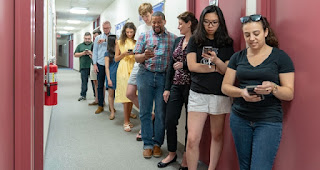I think that Wesch and Turkle have different approaches but ultimately have similar beliefs. Turkle discusses the idea that the many devices we have, keep us connected but separate. We are often "alone together," meaning we are in the same room, but not actively interacting with one another. She reminds us that "face to face conversations unfold slowly" and that they require time and patience. It is not a simple question/answer format. She suggests that this idea of instant answers has changed the way we converse, making us ask less intellectual questions, so that we can be instantly gratified with an answer. Wesch similarly suggests that our students are having a difficult time finding meaning in their education. This is something I see/hear regularly from my high school students. They believe that high school is a waste of time and that nothing in the classroom is relevant to them. In some cases, I think they are correct. I think a lot of what is taught, can nowadays, be found on the internet with a click of a button. Although they say it differently, I think both authors have the same message.
Wesch says, "My job becomes less about teaching, and more about encouraging students to join me on the quest." He is acknowledging that our students no longer need us to "teach" them the basic steps of things - that's what "Google" is for! Our students need us to help them learn how to dig deeper. This idea connects to Sinek for me. We need to teach our students to think about the "why" not the (immediate) what. The "what" is the by product of the "why" - the what is the actual topics/material learned, but the why behind the learning is where we can spark the students curiosity.
Turkle says, "When people are alone, even for a few moments, they fidget and reach for a device. Here connection works like a symptom, not a cure, and our constant, reflexive impulse to connect shapes a new way of being." This really struck me because it's something I can easily relate to and am ever conscious of. Whenever I'm waiting in ANY type of line, Disney line, grocery checkout, amusement park ride, the deli (ugh!), I take a moment and observe the other people who are waiting. Nearly 100% of the time, people are on their devices.
This stands out to me as a parent. A while ago (before I gave up social media), I frustratingly asked my daughter (5ish at the time) why she couldn't just stand in the checkout line at the supermarket without touching EVERY little item??? She calmly pointed out that she was touching things because she didn't have a phone to touch while she waits. Woah! Thanks for the reality check, little one. Why can't our children (or students) wait patiently/think through problems? Well, because it is not regularly modeled for them! Even as a teacher, my students may ask a question I do not know (typically geography related) and my immediate answer is..."well, I don't know...let's google it!" Instead, I could take these opportunities to encourage my students to dig deeper, and best yet, learn along with them!


It is crazy when we have those reality checks. I noticed that when I warned my students of a cell phone ban his initial response was, "Ok if that happens I don't want you to touch your phone all day in school Miss DeSousa." Could I actually do it???? I do not know. If that went through we could be doing them a great disservice.
ReplyDeleteStefanie, I agree with you on the idea that Turkle and Wesch have similar beliefs. I love how you mentioned the idea of Wesch taking a step back from teaching the basic steps and allowing students to use technology in order to teach themselves.
ReplyDelete